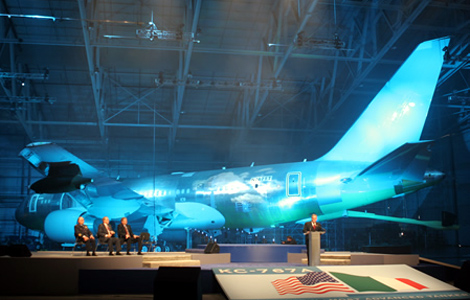Wichita Takes a Hit
For aerospace workers in Kansas, the New Year started off with more bad news

Better days: Boeing execs unveil the first KC-767-A tanker at the company's Wichita facility in 2005.
For aerospace workers in the greater Wichita, Kansas area, the New Year started off with more bad news. Boeing this week announced the planned closure of its plant there by the end of 2013, a move that will shutter a historic aircraft factory and displace over 2,000 workers. The plant, which once turned out B-29 bombers, has been used to modify aircraft for military missions and to perform maintenance. That work will now move to the Seattle, Washington area. Boeing will offer some workers transfers to its other sites.
State and local officials say they feel betrayed by the decision, because when Boeing was competing with Europe’s Airbus for a new Air Force tanker contract, Wichita and Kansas politicos helped persuade the Air Force to award the contract to Boeing. Whether the company made promises or not, Wichitans believed the tanker contract would mean a boost to their job market and local economy.
Wichita is known in industry as an “aerospace cluster,” meaning an aggregation of prime airframe makers and their suppliers within a defined geographic area. Industry clusters are often the beneficiary of support from state and local development financing, in return for pledges to create jobs.
Hawker Beechcraft, another Wichita aircraft maker that has benefited from local government support, has filed suit to stop the Air Force from sole-sourcing a new light air support aircraft to the Brazilian firm Embraer. That company’s EMB 314 Super Tucano, designed for the dual roles of training and counter-insurgency, won an order in December for 20 of the aircraft to be built in the United States by the Sierra Nevada Corporation of Sparks, Nevada, for eventual deployment in Aghanistan. In addition to Brazil, the air arms of Colombia, Ecuador, Chile, and the Dominican Republic operate the EMB 314 in the counterinsurgency role, with an order from Indonesia for 16 to begin delivery in 2012. A temporary stop work order from the Air Force went into effect this week and will await a court’s decision in the matter.
Hawker Beechcraft’s entry is its T-6 Texan II, which is derived from the Swiss Pilatus PC-9, a design that won the Joint Primary Aircraft Training System (JPATS) contract in 2001. Both the Air Force and the U.S. Navy conduct primary flight training with the T-6 (A and B models). The aircraft are also operated by the air forces of Canada, Iraq, Israel, Greece and Morocco.
The Wichita manufacturers have been staggered by a stalled economy, and there have been extensive layoffs following a series of boom years for business aircraft and a modest resurgence in light aircraft for private owners. The city that has touted itself as the “Air Capital of the World” would like some good news for a change.